Related Research Articles

Badfinger were a Welsh rock band formed in 1961 in Swansea. Their best-known lineup consisted of Pete Ham (guitar), Mike Gibbins (drums), Tom Evans (bass), and Joey Molland (guitar). They are recognised for their influence on the 1970s power pop genre. It is estimated that the band sold 14 million records.
Maybe Tomorrow is the debut album by British rock band Badfinger. Maybe Tomorrow is the only release under the band's original name as The Iveys. It was issued in 1969 on the Apple label in Japan, West Germany and Italy. Although the album was scheduled to be released worldwide, the release in the US and UK at that time was halted without explanation. Many reasons for halting the album have been suggested by the band and Apple employees, but the most common theory is that Apple's newly hired president, Allen Klein, stopped all non-Beatle releases on Apple until he could examine the company's finances, which were in disarray at the time.
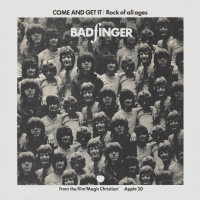
"Come and Get It" is a song composed by English singer-songwriter Paul McCartney for the 1969 film The Magic Christian. The song was performed by Badfinger, produced by McCartney and issued as a single 5 December 1969 in the UK, and 12 January 1970 in the US, on the Beatles' Apple label. It was the band's first release under the Badfinger name and was their international breakthrough, hitting the top 10 in both the UK and US singles charts.
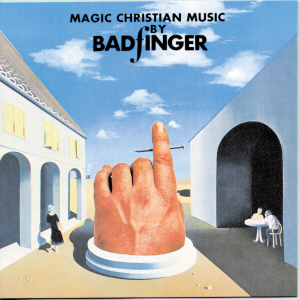
Magic Christian Music is the second studio album by the British rock band Badfinger, released on 9 January 1970 on Apple Records. It was their first release under the Badfinger name, having previously released the album Maybe Tomorrow in 1969 under the name The Iveys. It includes the band's first international hit, "Come and Get It", written and produced for them by Paul McCartney.

"No Matter What" is a song originally recorded by Badfinger for their album No Dice in 1970, written and sung by Pete Ham and produced by Mal Evans.

The Magic Christian is a 1969 British satirical farce black comedy film directed by Joseph McGrath and starring Peter Sellers and Ringo Starr, with appearances by John Cleese, Graham Chapman, Raquel Welch, Spike Milligan, Christopher Lee, Richard Attenborough and Roman Polanski. It was loosely adapted from the 1959 comic novel The Magic Christian by the American author Terry Southern, who co-wrote the screenplay adaptation with McGrath. The film also features pre-Monty Python appearances of John Cleese (credited) and an uncredited Graham Chapman, who had jointly written an earlier version of the film script. It also features an uncredited appearance by Yul Brynner performing “Mad About the Boy” as a drag artist.

Thomas Evans was an English musician. He is best known for his work as the bassist of the band Badfinger.

"Day After Day" is a song by the British rock band Badfinger from their 1971 album Straight Up. It was written by Pete Ham and produced by George Harrison, who also plays slide guitar on the recording. The song was issued as a single and became Badfinger's biggest hit, charting at number 4 in the United States and number 10 in the UK, ultimately earning gold accreditation from the Recording Industry Association of America.
"Well Well Well" is a song by English musician John Lennon from his 1970 album John Lennon/Plastic Ono Band. The eighth and longest track on the album, "Well Well Well" features an aggressive guitar sound, screaming vocals and a pounding backing track.

"Baby Blue" is a song by Welsh rock band Badfinger from their fourth studio album, Straight Up (1971). The song was written by Pete Ham, produced by Todd Rundgren, and released on Apple Records. As a single in the US in 1972, it went to #14. In 2013, the song was prominently featured in the series finale of the television show Breaking Bad. As a result, the song charted in the UK for the first time, reaching #73.
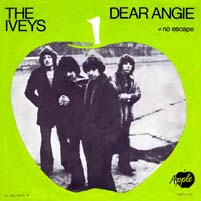
"Dear Angie" is a song composed and sung by bassist Ron Griffiths of The Iveys for the album Maybe Tomorrow. It was released as the group's second single in some European markets, and it was also included on the Badfinger album Magic Christian Music.

"Maybe Tomorrow" is a song composed and sung by guitarist Tom Evans of The Iveys, which was released as the group's first worldwide single on Apple Records. It also served as the title track for the album Maybe Tomorrow, and it was also included on the Badfinger album Magic Christian Music released in 1970.

"Apple of My Eye" is a song recorded by the rock/pop band Badfinger for inclusion on their 1973 album, Ass. The song was written and sung by Pete Ham, produced by Chris Thomas and Badfinger, and released on Apple Records.
"Heart of Gold" is a song by the British rock band The Kinks. Written by Ray Davies, the song appeared on the band's 1983 album State of Confusion.
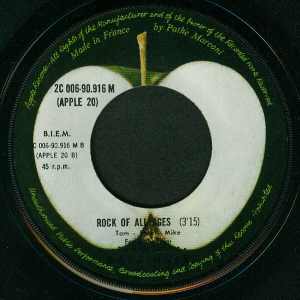
"Rock of All Ages" is a song written by Tom Evans, Pete Ham and Mike Gibbons that was first released on Badfinger's 1970 album Magic Christian Music. It was also released as the b-side to Badfinger's hit single "Come and Get It". The song was originally used as part of the soundtrack for the 1969 film The Magic Christian, starring Peter Sellers and Ringo Starr. The song was produced by Paul McCartney.
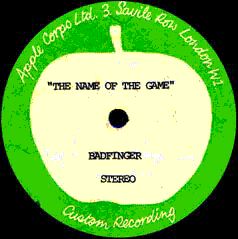
"Name of the Game" is the sixth track from power pop band Badfinger's 1971 album, Straight Up. The song was written by Pete Ham.

"I Miss You" is a song by the British power pop band, Badfinger. Written by Pete Ham for their first Warner Bros. LP (Badfinger), it served as the opening track and sole U.S. single for said album.

"Lost Inside Your Love" is a song by the British power pop band Badfinger. Written by bassist Tom Evans, "Lost Inside Your Love" was the third track on the band's 1979 album, Airwaves.
"We're for the Dark" is a song written by Pete Ham that was released as the closing track on Badfinger's 1970 album No Dice. It was later covered by Loud Family.

Brother is the debut album by the American pop-rock duo Lon & Derrek Van Eaton. It was released on the Beatles' Apple record label in September 1972 in the United States and February 1973 in Britain. It includes the single "Sweet Music", produced by George Harrison, and was otherwise produced by Klaus Voormann, a friend and longtime associate of the Beatles. On release, the album received favorable reviews from music critics but failed to achieve commercial success. Rolling Stone critic Stephen Holden hailed it as a "staggeringly impressive first album".
References
- 1 2 3 4 5 6 Viglione, Joe. "Carry on Till Tomorrow". Allmusic. Retrieved 2024-03-14.
- 1 2 Roberts, Janey. "Top 10 Badfinger Songs". Classic Rock History. Retrieved 2024-03-14.
- ↑ Deming, Mark. "Badfinger". Allmusic. Retrieved 2024-03-14.
- 1 2 3 4 5 Day-Webb, Robert (2022). Badfinger: Every Album, Every Song. Sonicbond. pp. 39–40. ISBN 9781789521764.
- 1 2 3 4 5 Matovina, Dan (1997). Without You: The Tragic Story of Badfinger. Frances Glover Books. pp. 99–100. ISBN 9780965712200.
- ↑ Erlewine, Stephen Thomas. "Magic Christian Music". Allmusic. Retrieved 2024-03-14.
- ↑ Mendelsohn, John (May 14, 1970). "Magic Christian Music". Rolling Stone.
- ↑ Kaye, Roger (December 25, 1983). "String of tragedies marked Badfinger". Fort Worth Star-Telegram. p. 2E. Retrieved 2024-03-20– via newspapers.com.